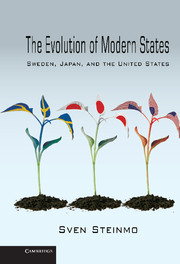4 - The United States: Strong Nation – Weak State
Published online by Cambridge University Press: 05 June 2012
Summary
The United States of America is the richest and most powerful nation on earth. It is, by definition, unique. Indeed, the study of American politics is generally considered to be so special that it warrants its own sub-field in most political science departments. Those who do try to compare America typically write about what is called “American Exceptionalism.” Of course this makes eminent sense, America is the dominant military and economic power in the world and it has used this power to shape the world around it. Even in the midst of one of the worst economic crises in history, America produces approximately 25 percent of the world gross product. No other country has the influence (for good or ill) as does the United States.
I argue below that America's particular political and economic systems are themselves products of its unique political origins and geographic position. But unlike some students of American exceptionalism, I do not believe that America's pilgrim origins defined its specific path. Instead, I try to weave an evolutionary narrative that shows how the initial conditions and timing of American democracy have interacted over time with this country's resource wealth, fragmented political institutions and historical experience. In other words, while it is true that we can draw a line back through history and sketch the developmental pattern, this does not mean that there was any kind of determinacy in the particular outcomes we find today.
- Type
- Chapter
- Information
- The Evolution of Modern StatesSweden, Japan, and the United States, pp. 149 - 205Publisher: Cambridge University PressPrint publication year: 2010



